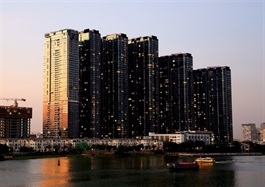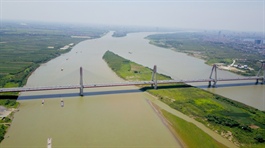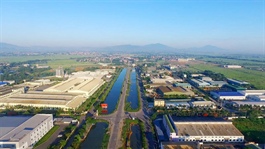Falloff persists for real estate in tourism
Falloff persists for real estate in tourism
Tourism real estate is still attempting to get on the front foot amid reduced selling prices and slow liquidity.

Market reports for the first eight months of 2023 from the Ministry of Construction indicate that the tourism real estate segment is recovering, with 10 projects completed and bringing to the market more than 4,000 products.
But Tran Ha, investor of a project with nearly 200 condotel units in the central city of Danang, revealed that despite launching many preferential policies and great discounts of up to 25-40 per cent, fewer than 20 units have been sold this year.
“Liquidity is so slow that we are forced to tighten our budget, temporarily stop selling, and accepting inventory to reduce operating, brokerage, and advertising costs,” Ha said.
Most resort real estate segments across the country are suffering, pushing inventory to alarming numbers over the past half-decade.
According to property consultancy DKRA’s latest report, the cumulative condotel inventory as of July had jumped to more than 42,000 units, and condotel consumption was 78 per cent lower than the same period of last year.
Meanwhile, the total inventory of coastal town house properties, including beach villas, increased to approximately 30,000 products.
Vo Hong Thang, deputy director of research and development from DKRA Group, said that the inventory of town houses and beach apartments is at an alarming level and there seems to be no solution to improve liquidity.
“The real estate market will recover for the residential real estate serving essential consumer needs first, in parallel with the return of good economic growth. Only after people have accumulated and have excess money then they start thinking about resort real estate, which is often considered a second home and not essential consumer real estate,” Thang said.
Thang added that investors and developers of resort real estate continue to be cautious in bringing new products to the market.
“Market liquidity is expected to face many difficulties and it is unlikely that there will be sudden changes in the short term. Policies to support interest rates, grace principal debt, and extended payment schedules are continuing to be applied by many investors and developers amid the current quiet market,” he added.
A report from the Vietnam Association of Realtors (VARS) points out that high-end resort products priced over VND10 billion ($416,000) have reported very few transactions so far this year.
“While macro policies from the government have not really been absorbed into reality, businesses still have to adapt with situational solutions such as increasing promotions, extending payment terms, and increasing discounts to 25-50 per cent of the selling price,” the report said.
The market’s difficulties are also stifling individual investors. Nguyen Hoang, a private businessman who owns two condotels on Phu Quoc for lease, said that the revenues from the condotels this year has not been enough to cover expenses.
“There are fewer tenants, while pressure from debt of more than $83,000 means I was forced to sell one apartment at a loss of 10 per cent compared to what I had paid. But no buyers have been found over the past six months,” Hoang said.
Market research reports also indicate that the profit margin of resort real estate is currently very low, only reaching around 3 per cent, with very few projects achieving 4-5 per cent or more. Many projects are unable to reach a commitment of 8-12 per cent to their owners due to the low occupancy rates, according to VARS.
Pham Anh Khoi, general director of Tulip Real Estate Financial Services Company, said that when the economy is struggling, confidence in the real estate market declines, making it more difficult to attract buyers in resort real estate.
“Regardless, under the cycle of the real estate market, the resort segment can only be warming up when other main segments such as town houses, apartments, and land have resumption signs. This process can take a couple of years,” Khoi said.
According to Khoi, a series of investors in the primary market are struggling with financial difficulties. The secondary market, meanwhile, depends heavily on the tourism industry.
“If tourism increases again, the high occupancy rate at hotels can attract the attention of investors to do business in this segment,” Khoi said.
To support the real estate market’s recovery and growth, the government has issued many new policies over the past year, together with others from ministries and the State Bank of Vietnam. These include documents on the safe and sustainable development of real estate, relieving pressure on bond payments for businesses, reducing operating interest rates, building one million social houses, and a credit package of $5 billion to support investment loans and purchase of social houses, among other regulations.

























